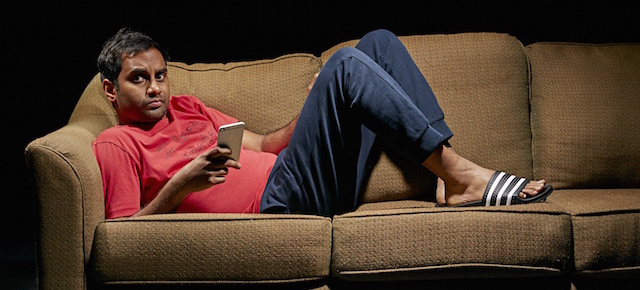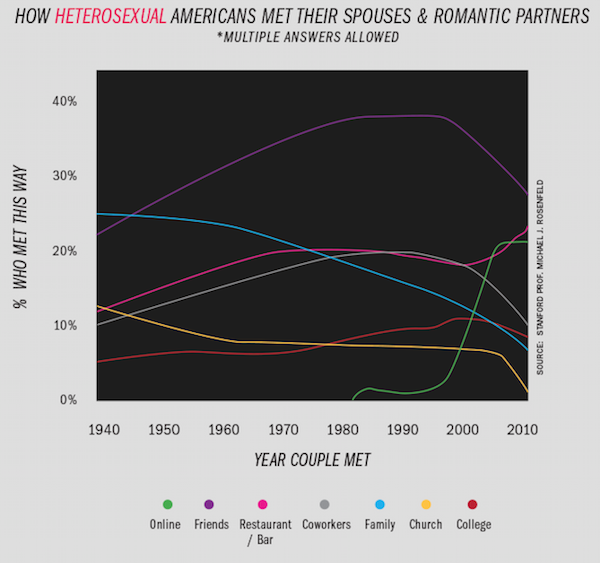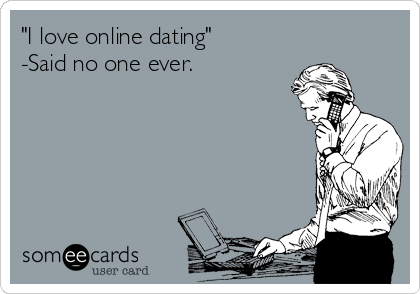
Don’t know where I’ve been, but comedian Aziz Ansari, AKA the artist formerly known as Tom Haverford, has a book coming out next week, his first. Instead of a stand-up routine on paper, he’s done something unexpected, teaming up with a sociologist named Eric Klinenberg to pen something on the state of Modern Romance. Time Magazine published a precis of the book the other day, and while it’s certainly funny, what’s surprising is how serious it is. Aziz takes as his jumping off point the fact that his parents, who had an arranged marriage, seem to be a whole lot happier than most of his peers, or their parents. His opening observation is that great paradox of modern relationships: we are spending more time and money searching for a mate than any time in human history, yet having a harder time finding someone to settle down with than ever before.
What’s clear is that, despite our claims about having shucked off the ‘supernatural’ when it comes to making life decisions (see disheartening graphic below), the “soulmate” myth has completely taken hold of our culture. This myth–of “the One” out there for each of us–not only puts incredible pressure on any potential partner to be everything we ever wanted, but on our own ability to know what we want. Suffice it to say, the article contains low anthropology gems galore. The paradox of choice appears to be wreaking havoc too:
But people don’t always know what they’re looking for in a soul mate, unlike when they’re picking something easier, like laundry detergent.
While we may think we know what we want, we’re often wrong. As recounted in Dan Slater’s history of online dating, Love in the Time of Algorithms, the first online-dating services tried to find matches for clients based almost exclusively on what clients said they wanted. But pretty soon they realized that the kind of partner people said they were looking for didn’t match up with the kind of partner they were actually interested in.
Amarnath Thombre, Match.com’s president, discovered this by analyzing the discrepancy between the characteristics people said they wanted in a romantic partner (age, religion, hair color and the like) and the characteristics of the people whom they contacted on the site. When you watched their actual browsing habits—who they looked at and contacted—they went way outside of what they said they wanted.
It could be simple ignorance or delusion at work here, but I’d wager self-justification plays some role too. Meaning, there’s what we know we should want from a potential date, there are the right things to desire–what we may have even convinced ourselves we need–and then there’s what we actually want. Cause if there’s anything we know about our online selves, it’s how quickly and reflexively distance opens up between the ‘Should’ and the ‘Is’. That distance thwarts intimacy and fosters loneliness, not just in terms of our isolation from ourselves, but from others as well. This is well known.

So it would appear that we’re back to the perils of disembodiment yet again. Online dating can be a great way to meet folks, but if pitched too high (or when it becomes the sole avenue for romantic endeavor), it can also exacerbate consumerist attitudes toward romance that set couples up for failure, ignoring as they do the compromise/sacrifice aspect of love, which arranged marriage seems to acknowledge up front. If you want to be shocked along these lines, listen to the most recent episode of the Reply All podcast, which uncovers the online vicissitudes of the phenomenon known as “yellow fever”. Oy vey.
In the parlance of this site, online dating sites are often set up from a starting point of Law (check all the boxes and pass all the tests first, acceptance second), whereas arranged marriages, at least in certain cases, come from a place of Grace, where the Yes precedes the ‘proving’. Perhaps I’m stretching things, but you get the idea. Of course, as nifty as arranged marriages sound (in this context), I don’t see them being re-instituted anytime soon. And even if they were, it’s not as though those don’t involve two sinners trying to make it work.

Aziz goes on to quote renowned moral psychologist and Mbird fave Jonathan Haidt on the two “danger points” in most relationships, i.e. when they are most likely to fall apart. One is at the height of the initial passion, or honeymoon phase, when the euphoria (and mutual projection) leads people to make rash decisions. The other comes at the 12-18 month mark when the dopamine has runs its course, and the ’embodied’ reality of the other person comes into view. If a couple can hang in there during this phase, odds are good that they’ll stick together, presumably because limitations have been identified and forgiven (provisionally at least). What’s the kind of thing that can send a couple off the rails in this delicate period? One guess:
When I first started dating my girlfriend, a few months in, I went to a friend’s wedding in Big Sur, Calif. I was alone, because my friend did me a huge solid and declined to give me a plus one. Which, of course, is the best. You get to sit by yourself and be a third wheel.
The vows in this wedding were powerful. They were saying the most remarkable, loving things about each other. Things like “You are a prism that takes the light of life and turns it into a rainbow” and “You are a lotion that moisturizes my heart. Without you, my soul has eczema.” It was the noncheesy, heartfelt version of stuff like that.
After the wedding, I found out about four different couples that had broken up, supposedly because they didn’t feel like they had the love that was expressed in those vows.
It’d be ironic if it weren’t so tragic: the fervent belief in a soulmate doesn’t translate into faith in said soulmate once found. If anything, it seems to manifest itself as an anxiety hanging over the relationship. As a sidenote, this is one of the many reasons why I love the BCP wedding service, with its prayer for all those who are married.
Of course, the last thing I’d want to do is begrudge anyone their online dating. We’ve all heard far too many success stories at this point. And even if we hadn’t, I’m sure people ‘out there’ are sick of those of us who’ve never had to negotiate the current scene weighing in on its pitfalls. Whatever its pluses and minuses, like it or not, online dating is the Is right now.
No, if there’s any point to all this, it’s the one that Marina Abramovic told Food & Wine this month, “People are so lonely, everywhere”. Love is always in short supply, and anything that makes finding it easier, or less scary, is probably a good thing, even if it plays to our inner narcissist. Because love itself has a funny way of overwhelming and rewiring those tendencies anyway.
Which is to say, instead of treating love like a problem to be solved, perhaps these reports are simply another excuse for remembering that, despite our many prevarications, love has found us. (1 John 4:10).
I can’t think of a better introduction to Yann Dall’Aglio’s TED talk “Love, You’re Doing It Wrong”, which suggests that our best chance for love is found, not in mutual attraction but in mutual uselessness. It’s in French, but there are subtitles and it’s only 10 minutes (here’s the English transcript). Beautiful:

COMMENTS
8 responses to “The Tom Haverford Guide to Online Dating (and Arranged Marriages)”
Leave a Reply













Have you heard of Jonathan Grant? He’s a minister out in NZ who released a book that had a lot to do on this phenom (and tries to build a positive along Jamie Smith’s work). Anyway, he questions whether the medium of the internet is even setting people up for failure in a lot of ways.
With online dating, no one (friends, family, acquaintances etc.) can scrutinize your initial choices, you only interact with peoples’ projected images & desires, and you are encouraged to always keep looking. A friend told me that even after a long time had lapsed, and he had found a girl through online dating, he was continually emailed about new people looking at his profile and that they’re only a ‘click’ away.
Divorce and dating is good business!
Like you said, arranged relations are not coming back and they have their own pitfalls (despite some attraction). And the whole “courtship” model is a recipe for fear and control to reign through an application of some impossible standard of perfection. There’s nothing perfect under the sun.
But if we actually maintained some sense of community, friends and family whose council mattered, then perhaps the idea of “meeting someone at Church/friends/coworker of friend” would increase.
The problem is the whole ‘ethos’ of finding the right someone, and that won’t come out through some model or practice, but a deflating of our foolish pride and understanding our vanities.
Haven’t heard of Jonathan Grant. I take it the one you’re talking about is the one coming out in July, Divine Sex? Sounds intriguing to say the least.
Totally agree re: the courtship model. The intention seems noble, but in practice it almost automatically turns into a control thing, where whatever fears and biases we have about physicality are allowed to run wild. Sex gets cast as the enemy, subliminally if not outwardly. Takes years to unwind that kind of thing in a marriage.